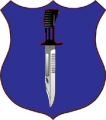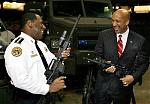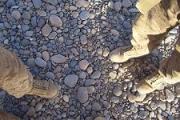Two points I would make right off the bat:
1. First and most important - From the standpoint of my involvement in proposing change to how we fought, which began in earnest in 1972 when I was an AWS student, it, in the beginning, had nothing to do with Blitzkrieg or the Israelis, or rapidity or the OODA Loop. Those things came later. My concern was singular: We were not studying our profession in a scholarly way. I was an academy grad, I'd been to several Marine and Army professional schools, and no one had required me to look into and learn whatever Nimitz, Patton, et al., had learned.
Academy curriculum had morphed more and more into the curriculum of a civilian universtiy - the result of some kind of an inferiority complex the Navy seemed to have. Marine schools had settled into teaching rules and checklists, not theory. I was a bachelor at AWS with no wife to want me home in the evenings and little interest in boozing it up at Liversedge so I spent my evenings at Breckinridge Library. I READ FERDINAND FOCH'S "PRINCIPLES OF WAR" among many, many other works because I felt like that's what a professional officer ought to be doing. To skip over many details of a very long story, when I found myself on the faculty of AWS in 1979, I decided it was time to start doing whatever I could in whatever small way to fix the problem of not approaching our profession as would a scientist or an artist, looking for new ways, better ways--just viable ways--to do our job effectively. That's WHY I introduced myself to anyone and everyone who seemed to be working on the problem, too. That's why I introduced myself to Bill Lind in 1979 and it's why I took Bill up on his suggestion that I introduce myself to John Boyd. It's why I went into General Trainor and argued that we ought to get Col. Boyd down to Quantico. And then as we moved forward, sifting through the body of literature that existed, including Foch (whose writings didn't electrify me), Fuller (whose writings did electrify me), Liddell Hart (who was useful in a number of ways), Manstein (whose writings were great), sifting, rejecting, accepting - and out of it all came something that somebody (over my objection and over Boyd's objection) had decided to call Maneuver Warfare. But the MW buzzword was catching on and this was a good thing. Neither John nor I thought it would be productive to waste time arguing over a name - that was, after all, part of the problem at Quantico. Marine officers were arguing over names for control measures and checklists for attacks and defenses. Out of it came what went into FMFM-1 after Al Gray became CMC. So--it's not as Owens seems to think-- that somebody had a theory he wanted to float. All we really wanted to do was to get professionals acting like professionals, studying, questioning, etc. I hope we are still doing that.
2. This one just a burr that stays under my saddle. THERE IS NO DISCONNECT BETWEEN SO-CALLED MANEUVER WARFARE AND COUNTERINSURGENCY AND COUNTERTERRORISM. I can lay it all out for the 999th time - but not now.

















Bookmarks